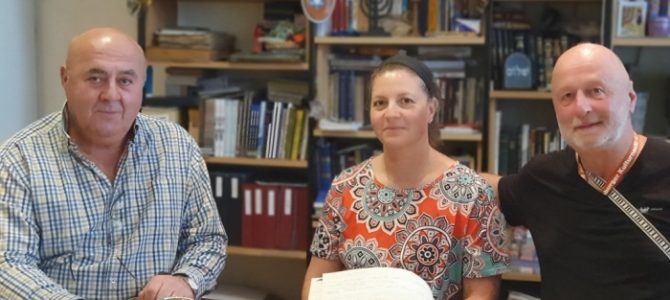With virus restrictions eased, the Panevėžys Jewish Community received some foreign visitors interested to learn more about their relatives, their biographies and their fate.
Yeir and his wife, both from Israel, visited us on July 25. He’s the great-grandson of famous Panevėžys rabbi Rabinovitch, the ilui who lived and worked here for more than 20 years. Yeir was keen to learn more about religious life in Panevėžys in the late 19th and early 20th centuries. He experienced the city and visited Jewish heritage sites here.
According to archive documents from 1857, eight synagogues in Panevėžys are mentioned, with a few more synagogues located in private residences. Religious life in Panevėžys is the subject of a forthcoming book called “Žvilgsnis į praeitį: Panevėžio žydų istorija ir palikimas” [A Glimpse into the Past: The History and Legacy of the Jews of Panevėžys], already printed and soon to be launched.
On August 2 Siegmar Horst, a writer from Germany, and his wife Sonja visited the Community. They were interested in what became of the Jewish woman Rokha Smolnik who lived in Panevėžys from 1920 to 1941.
From what the Panevėžys Jewish Community was able to gather from our archive material, Rokha was born in March of 1899 in Kupiškis, Lithuania, and lived in Panevėžys until World War II. She was married to Abraham Labo who was born in 1889 in Sudergis [near Utena in Lithuania]. He was a cobbler. They married December 27, 1929. The Panevėžys Jewish Community archive conserves a copy of their marriage license. According to a document the visitors brought with them, Rokha Smolnik received a passport from the German military regime in 1917.
In 1941 Rokha’s husband Abraham Labo was arrested and deported to a concentration camp in Munich, Germany. On December 31, 1944, he died at Waldeger Labor Camp 5. It appears Rokha Labo née Smolnik probably died in Panevėžys during the Holocaust.


